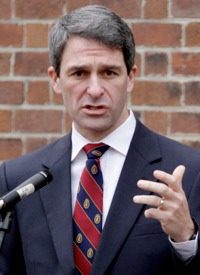
That case, filed by Virginia Attorney General Ken Cuccinelli (R), challenged only the individual mandate, which requires individuals to purchase health insurance or pay a penalty. U.S. District Court Judge Henry E. Hudson ruled in Cuccinelli’s favor in December. The Obama administration appealed to the Fourth U.S. Circuit Court of Appeals, which has scheduled arguments in this appeal, along with that of another Virginia case decided in the administration’s favor, for May 10.
Cuccinelli requested that the Supreme Court take up his case immediately rather than waiting for it to go through the appeals process, arguing that the appeals court won’t be able to resolve the constitutional issues raised in the case definitively and that it is almost certain to end up before the high court anyway. In addition, he maintained that meeting other requirements of the healthcare law is imposing costs on the state of Virginia that could be saved if the court were to overturn the law quickly.
Acting Solicitor General Neal Katyal, writing for the administration, begged to differ. Agreeing with Cuccinelli that “the constitutionality of the minimum coverage provision is undoubtedly an issue of great public importance,” Katyal nevertheless argued that it “is not, however, one of the rare cases that justifies” skipping the appeals process, especially given that the individual mandate does not go into effect until 2014. “The constitutionality of the minimum coverage provision,” he pointed out, “is already under expedited review in three courts of appeals, and expedition has been sought in a fourth.” Furthermore, even if the Supreme Court were to grant Cuccinelli’s motion, he said, the court would not likely be able to hear the case before fall, by which time one or more of the appeals may very well be on its docket anyway.
In addition, Katyal averred, the costs incurred by the state to implement provisions of ObamaCare outside the individual mandate — provisions that had neither been challenged by Cuccinelli nor invalidated by Hudson — do “not constitute an extraordinary circumstance warranting” expedited review by the Supreme Court. “In any event,” he added, “the petition provides no examples of substantial resources currently devoted to compliance with the” law.
Katyal also took issue with Cuccinelli’s standing to file his case in the first place, arguing that a state does not have the right to sue the federal government on behalf of its citizens.
Most of Katyal’s arguments seem well-grounded and reasonable. His one truly groundless assertion is that “no court has precluded the government from preparing to implement the Affordable Care Act under the schedule Congress established.” This is simply not the case. Hudson, for one, stated that his ruling against the individual mandate was “sufficient to stay the hand of the Executive branch pending appellate review.” Likewise, U.S. District Court Judge Roger K. Vinson, upon ruling that the entire healthcare law is unconstitutional, declared that his decision was “the practical equivalent of … an injunction.” The administration nonetheless proceeded with implementing the law, later disingenuously asking Vinson to “clarify” his ruling. Vinson, perturbed with the administration’s dawdling and its obvious attempt to circumvent the clear intent of his decision, issued a stay of his ruling on the condition that the administration file an expedited appeal within seven days.
In granting the stay, Vinson took note of the fact that “the Executive Branch seeks to continue the implementation, in part, for the very reason that the implemented provisions will be hard to undo once they are fully in place.” Indeed, it is likely that the administration, despite its reasonable-sounding arguments against the Supreme Court’s hearing Cuccinelli’s appeal, is far less concerned about adhering to established legal procedures than about ensuring that as many provisions of ObamaCare get woven into the fabric of American society before the high court has an opportunity to rule on it.
Although Cuccinelli is correct that the Supreme Court needs to rule on the constitutionality of ObamaCare, it may actually be just as well if the various cases are permitted to work their way through the normal appeals process. Were Cuccinelli’s case to be considered first, the court might very well uphold Hudson’s ruling, voiding only the individual mandate. Other provisions could continue to be implemented until such time as the court ruled on Vinson’s decision, if it even chose to do so.
The appeal of Vinson’s ruling will be heard by the Eleventh U.S. Circuit Court of Appeals on May 25, just 15 days after the Fourth Circuit hears the appeal of Hudson’s. The cases thus seem likely to be ready for review by the Supreme Court at roughly the same time. If the court chose to take up both cases at once, along with any others that had completed appeal at that time, the outcome of the hearing would then be a definitive ruling not just on the individual mandate but on the whole of ObamaCare. Such certainty would be welcome. As Vinson put it, “The sooner this issue is finally decided by the Supreme Court, the better off the entire nation will be.”
Photo of Ken Cuccinelli: AP Images



